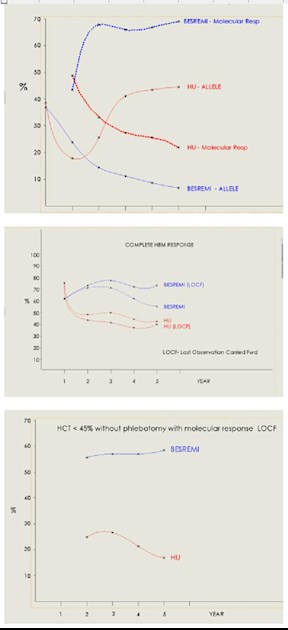EDIT NOV 28: See larger plot images in reply section below, these are easier to read.
I posted a while ago a plot of allele data from the Conti PV study. I've plotted more of the data from text in the report linked here. I can't find such plots in any public report, I don't know why, they add good visual info. These are my interpretations.
In my opinion the Besremi studies (PROUD and Continuation PV) are among the most detailed and understandable studies for INF in MPN. Plus the only one I know with a simple comparison to HU. Many of the earlier ones for earlier INFs are more difficult for me to follow.
I hope the image not too small, this site limits images to one per post.
mpn-hub.com/medical-informa...
This may be part of my presentation to Dr and Insurance Co toward authorizing (paying for) Besremi INF. (this is US insurance stuff, UK and others are very different we've seen here) I have a non-medicare PPO policy. Ins co says we need to show why the new therapy is "beneficial". Interestingly there is no need to compare Pegasys since that is not FDA approved hence not "equivalent". Insurance rep looked for alternatives, expecting to find some. I told her you won't find any, she came back and said you're right.
-The top plot has the allele over time for INF (blue) and HU (red) as I posted before. Newly added is molecular response data. Note how widely Besremi and HU diverge in the two measures. Very "beneficial".
-The 2nd plot is Complete Hem Response. It shows two options, one is "Last Observation Carried Fwd". This method provides for patient trial drop outs, and seems controversial in the trade, so I showed as the report also included without that option. All show HU falls below 50% while INF stays above that. Not as striking as the Allele numbers but at 11-22% difference still "beneficial". I don't see any partial Hem response data in the report.
-The 3rd plot is meeting both of the two criteria of HCT<45% and molecular response. This combination is of interest to many MPN patients. This difference is quite clear and beneficial.
There are many quotes from the various reports that support INF being beneficial. I may post a collection I have later. Any other suggestions from our collective collections would be great to have.
It's curious to know whether UK NHS considers Pagasys to be equivalent to Besremi, as above my US Ins co does not require this comparison.
